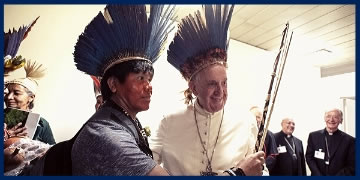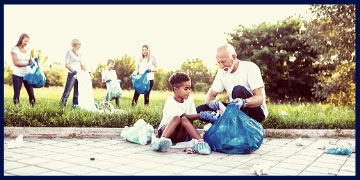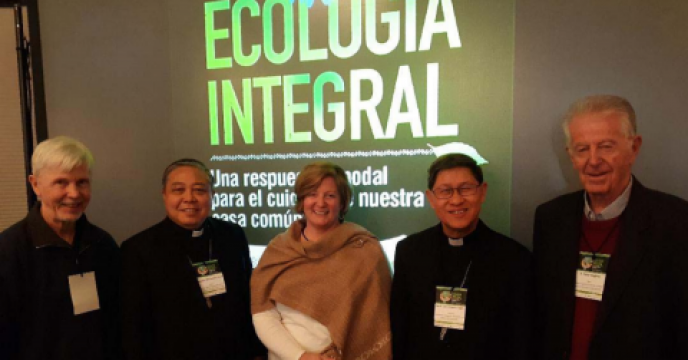
In October 2019, the bishops of the Amazon gathered in Rome to discern how people of faith can stand in solidarity with the exploited earth and marginalized communities. While the synod was about the Amazon, it is also a model for the entire world.
Every community of faith, wherever they are, is invited to listen to the experience of marginalized communities, take seriously the costs of environmental degradation, and discern how it can take action to protect all life.
The Missionary Society of St. Columban has lived in the Amazon region and accompanied the communities that call it home, including the natural world, for over half a century. On this webpage, you will find a series of articles about the Synod and the Amazon, as well as practical ways you can listen and respond to the "cry of the earth and the cry of the poor" (Laudato Si', #49).

Read the Pope's exhortation, The Beloved Amazon
Why is the Church committed to being an ally with the Amazon, and other marginalized communities?

Bring the Synod to Your Community
How can your faith community initiate a process of cross-cultural dialogue, ecological conversion, and collaborative social action?

Tell the Senate: Protect Environmental Defenders
Every year, hundred of people are killed or persecuted defending the environment. Tell the US Senate to protect them.
We have spent the last 200 years or so trying to deny the shadow side of our birth as a nation. Coming to terms with this history is vital for the future not only of indigenous people but of us non-aboriginal people as well.

Columban representatives Scott Wright (left), Peter Hughes (right) and Amy Echeverria (center) at the Pre-Synod Conference on the Amazon at Georgetown University with Archbishop Bernardito Auza and Luis Cardinal Tagle, from Manila.
We all have moments in our lives, like my daughter’s birth, when we feel both the immensity and intimacy of life tightly wound together. The Synod on the Amazon is one of those moments in the life of the Church – a moment when the Church, the people of God, and all of Creation are totally universal and utterly unique at the same time.
We must respect indigenous communities as the protagonists of their own destinies. In many cases, they've already developed solutions to the problems they face, and their challenge implementing these solutions is that they don't have the cooperation of governments, corporations, and other power-brokers. As citizens and consumers, we have a responsibility to hold these institutions accountable.
Much comes back to reviewing consumption beyond Earth's finite resources, challenging the commodification of life, alongside practical initiatives to get back to working with life systems and not against them. It is a commitment to hand on to future generations of human beings the beauty and abundance that is God's gift to us. And future generations are demanding now that their rights are recognised.
The Amazon, integral to the fabric of all life throughout the globe is often referred to as, "the lungs of the planet" (LS #38). What happens when the lungs are choked and life ceases? Pope Francis warns in Laudato Si' against the loss of biodiversity and connectedness with God's creatures as is experienced in the Amazon and other biomes around the world.
A Synod of Bishops for the Pan-Amazon region is scheduled to meet in Rome in October 2019 with the theme, 'The Amazon: New paths for the Church and for integral ecology'. Why?
Copyright © 2024 Columban Center for Advocacy and Outreach, Washington, D.C.